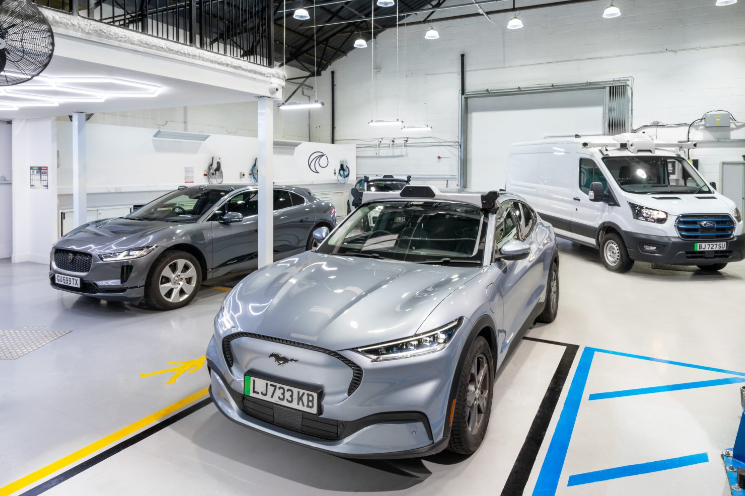 AI
AI
 AI
AI
 AI
AI
U.K.-based autonomous driving startup Wayve Technologies Ltd. said today it has closed on a bumper $1.05 billion funding round led by SoftBank Group Corp.
The round, which was also backed by Nvidia Corp. and Microsoft Corp., will help the startup to accelerate the development of its artificial intelligence-based self-driving technology and launch its first production models. Today’s round brings Wayve’s total amount raised to just over $1.3 billion, and ii’s notable for being the largest investment ever in a U.K. AI startup.
Founded in 2017, Wayve is the creator of an autonomous driving platform that’s based on “embodied AI,” which is a kind of AI that learns from human behavior and adapts accordingly. The company said this is a novel approach to autonomous driving that will enable vehicles to navigate better in situations that do not adhere to strict patterns or rules, such as when other human drivers make unexpected actions, or if pedestrians run out into the road without looking, or if a tree suddenly blows over onto the road.
“This will enable automakers and fleets to accelerate their transition from assisted to autonomous driving,” said Wayve Chief Executive Alex Kendall in an interview with Reuters.
Wayve says its AI technology has already been integrated into six different vehicles, including the Jaguar I-PACE and Ford Mustang MachE, where it is a part of their advanced driver assistance systems. As the company’s technology evolves and becomes more advanced, it will push out over-the-air updates to those vehicles to ensure they have the latest software.
Funding for self-driving car startups has become a lot harder to get than in years gone by, which means Wayve’s large round may raise a few eyebrows. That’s because a number of self-driving car developers have come up against some major problems when it comes to developing cars that can truly drive themselves. The challenge is perceived to be much more difficult than many had envisaged, and so enthusiasm for the idea has waned somewhat.
The autonomous driving industry has had a number of setbacks recently, too. Last October, a woman in San Francisco was reportedly dragged under a car operated by Cruise, the self-driving car unit of General Motors Co., after being hit by another vehicle driven by a human. Cruise was subsequently accused of withholding evidence regarding the accident, which resulted in its being stripped of its permit to test its vehicles on public roads.
One of the main challenges is that self-driving car systems lack the ability of humans to predict and assess risky situations in an instant, which is dangerous when unexpected incidents occur.
Wayve has been working hard to solve these headaches with its embodied AI system, which it says is similar to a “GPT for driving,” empowering any vehicle to better perceive its surroundings and drive safely through diverse environments. The software is designed to learn driving rules and patterns on its own, rather than needing them to be programmed in, so it can respond to new places and unpredictable scenarios on the road.
Wayve President Erez Dogan told Reuters that the company’s embodied AI models are capable of generalizing their driving knowledge from one scenario to another. He said this is necessary because “it’s nearly impossible to imagine every situation that a self-driving car needs to reliably handle.”
Dogan believes embodied AI can lead to a paradigm shift in the way machines interact with, and learn from human behavior. “By leveraging the raw power of AI, we can build an Embodied AI system that’s learned from real-world and synthetic data how to handle edge cases at a rate that surpasses human programming,” he said.
The funding round is apparently of great importance to the British AI industry, for the U.K. Prime Minister Rishi Sunak was only too happy to issue a supporting statement, saying he is “incredibly proud” that the country is home to pioneering companies such as Wayve.
“The fact that a homegrown British business has secured the biggest investment yet in a UK AI company is a testament to our leadership in this industry and that our plan for the economy is working,” Sunak said. “We already have the third-highest number of AI companies and private investment in AI in the world, and this announcement anchors the U.K.’s position as an AI superpower.”
Constellation Research Inc. analyst Holger Mueller said the fact Wayve obtained a quote from the PM shows how important the AI industry is to its future economic plans. And although SoftBank’s mixed investment record might be a tad concerning, he said it has done very well with its U.K.-based investments, with the most notable being the chipmaker Arm Ltd.
“Nvidia and Microsoft’s participation also bodes well,” Mueller said. “We must remember that for all of the fits and starts, we’re still in the early days of autonomous driving, and with embodied AI we have a new technology and approach that bodes well. We’ll see how Wayve’s self-driving cars perform on the roads soon enough.”
THANK YOU